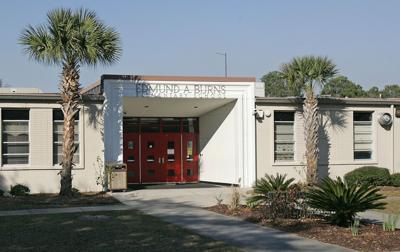Frustrated that several schools in North Charleston are inadequate, community leaders and residents said getting parents more engaged can help bridge the divide in the Charleston County School District.
The town hall meeting, held Monday night at the Alfred Williams Community Center, centered around what can be done to improve the state of eight high-poverty and predominately African-American North Charleston schools.
Chicora Elementary, Burns Elementary, Mathis Charter High, Mary Ford Elementary, Morningside Middle, North Charleston Elementary, North Charleston High and Stall High ranked among the worst-performing on state education report cards last year.
"It wasn’t a coincidence or an accident," said Charleston County School Board member Kevin Hollinshead, who organized the meeting. "We have to find a way to put the pieces back together. It's not a time to point fingers. We got to get the word out into the community that we want to have a voice in this situation.”
The meeting came in the wake of The Post and Courier's series, "Minimally Adequate," which examined huge education disparities rooted in South Carolina's racial history and local school choice policies.
Ten panelists — school board members, district employees and community activists — and more than 50 guests said that parental involvement, poverty and principal turnover, among other things, must be addressed to improve education for North Charleston children.
Stephanie Ganaway-Pasley, professor at Trident Technical College, said student success begins at home, adding that parents should take advantage of student and parent portals — which outline students' homework assignments — visit classrooms, and create relationships with teachers.
Ganaway-Pasley also said instructors should invite parents to PTA meetings and create a friendly environment in the classroom.
"If your child is going to a failing school, don't sit and read statistics," she said. "Get up. Go out. Find out what you can do as a parent."
Guests and panelists agreed, stating that parental involvement is the most important element that needs to be addressed.
But many said the topic has to be placed in the proper perspective.
The Rev. Thomas Dixon, a community activist, said many parents want to help their child excel in school but can't because they work several jobs and are struggling to make ends meet.
He said parents often get a bad rap for missing PTA meetings or school events.
"How can you do that when you are working two or three jobs, making $7.25 an hour and you've got to decide between putting food on the table and a roof over your head, or going to a PTA meeting," he said. "There are parents that aren't doing what they are supposed to do. But there are a whole lot of them that are. They just don't have the mechanisms available to help them along through this whole situation, such as a decent wage and a decent area to live in."
The town hall was held hours after Charleston County's school board approved a list of proposed changes that included redrawing district attendance lines to "give all schools the best chance for success."
The proposal followed a Clemson diversity study that found that nearly all of Charleston County's “Predominantly African American/High Poverty” schools are downtown or in North Charleston.
School board member Chris Collins, who expressed skepticism at the board meeting over whether redrawing lines would lead to success in the classroom, said that principal turnover has to be addressed in North Charleston schools.
Principals are often changed every two years and never have the opportunity to know the parents or get involved in the community, he said.
"We have what you call a breeding ground," he said. "Principals come here and work in the schools one, two or three years max. Then, they go on to a better school in West Ashley or Mount Pleasant. They don't stay put long enough."
Collins also pointed to school choice, encouraging parents to begin applications if they want their children to attend magnet and charter schools. Charleston County's school choice/magnet application process opened Feb. 11 and closes March 11 at 4 p.m.
Hollinshead said he plans to host a Saturday workshop where school board members and community leaders can consider residents' concerns and map out ways to address the problem. He also wants Charleston County's superintendent to have a round-table with North Charleston parents.
Leaders at charter schools like Prestige Preparatory Academy said schools must shoulder some of the burden if anything will change.
Joyce Coleman, executive director for the all-boys institution, said educators began home visits to encourage parents to get involved. The principal also had coffee with teachers at Starbucks.
"We decided to go in the reverse manner," she said.
Others said that for schools to improve, poverty in local communities has to be addressed.
North Charleston parent Elvin Speights contrasted Burns Elementary students, as an example, to those Mount Pleasant schools where he said many students may not be worried whether dinner would be available at home. He said for students in poverty, passing tests is not a top priority.
"When children are worried about these things, they're not going to learn. They're not focused on school," Speights said. "A lot of these kids, if they miss school, they miss meals."







